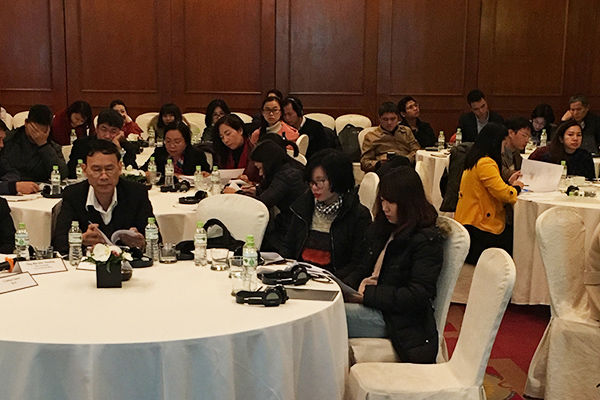ILSSA presents its findings about the “Needs of Participation in Voluntary Occupational Accident Insurance“

During the session, the hosting organisation Institute of Labour and Social Affairs (ILSSA) presented its findings of a survey about the needs of participation in voluntary occupational accident insurance of workers without labor contracts. The study had been conducted in Dalat to find out the needs of Vietnam’s employees. After the introduction of the Law on Occupational Safety and Health (Law No. 84/2015/QH13) in 2015, the Ministry of Labour – Invalids and Social Affairs (MOLISA) is currently drafting a Decree on voluntary occupational accident insurance in order to support employees and their families.
Cristina Lloret, an expert from ILO (International Labor Organization), highlighted international labor standards in her presentation. In accordance with Convention No. 102 (Social Security Minimum Standards) at least 50 percent of all employees including their wives and children should be protected by social security. Currently not even 25 percent of Vietnam’s workforce have compulsory social insurance. Hence the majority of employees are is not financially protected in case of accidents or illness. This is particularly challenging with regard to vulnerable population groups like females, migrant workers and those who are exposed to high risks (e.g. in the agro-forestry and aquacultural sector). The number of occupational accidents and victims in Vietnam is annually growing and has reached 8.000 incidents in 2016.

There has been an ongoing discussion whether occupational insurance in Vietnam should be voluntary or compulsory. According to Mrs. Quyen (Deputy Director Center for Population, Labor and Employment Studies ILSSA) “One of the main challenges with regards to the protection of Vietnam’s employees‘ is the fact that many either work in the informal sector or do not have a labour contract and are therefore not officially registered.“ Furthermore, a large part of them do not see the need for a voluntary insurance, which might be due to their already limited salary.
Cristina Lloret recommended that workers should not receive less than 50 percent of their salary rate in order to prevent their families from poverty. An efficient social protection system is an essential key factor to reachịng the Agenda 2030 goals in Vietnam including poverty prevention, good health and decent work.
